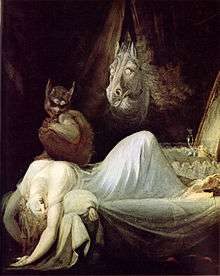incubus
See also: Incubus
English
WOTD – 27 May 2010

Johann Heinrich Füssli, The Nightmare, 1790-1791 portrait of an incubus.
Etymology
From Late Latin incubus, from Latin incubo (“nightmare, one who lies down on the sleeper”), from incubāre (“to lie upon, to hatch”), from in- (“on”) + cubāre (“to lie”).
Pronunciation
Noun
incubus (plural incubi or incubuses)
- (mediaeval folklore) An evil spirit supposed to oppress people while asleep, especially to have sex with women as they sleep.
- A feeling of oppression during sleep, sleep paralysis; night terrors, a nightmare.
- Synonym: nightmare
- 1621, Democritus Junior [pseudonym; Robert Burton], The Anatomy of Melancholy, Oxford: Printed by Iohn Lichfield and Iames Short, for Henry Cripps, OCLC 216894069; The Anatomy of Melancholy: […], 2nd corrected and augmented edition, Oxford: Printed by John Lichfield and James Short, for Henry Cripps, 1624, OCLC 54573970, (please specify |partition=1, 2, or 3):, vol. I, New York 2001, p.249:
- it increaseth fearful dreams, incubus, night-walking, crying out, and much unquietness […] .
- (by extension) Any oppressive thing or person; a burden.
- 2002, Colin Jones, The Great Nation, Penguin 2003, p. 132-3:
- Notions of civic virtue were at that moment changing, in ways which would make of Louis's alleged vices an incubus on the back of the monarchy.
- 2002, Colin Jones, The Great Nation, Penguin 2003, p. 132-3:
- (entomology) One of various of parasitic insects, especially subfamily Aphidiinae.
Translations
an evil spirit
|
|
a nightmare
oppressive thing or person; a burden
Dutch
Etymology
From Late Latin incubus, from Latin incubo (“nightmare, one who lies down on the sleeper”), from incubare (“to lie upon, to hatch”).
Noun
incubus m (plural incubussen or incubi, diminutive incubusje n)
Synonyms
- (nightmare) nachtmerrie
Latin
Etymology
From incubō¹ (“I lie upon”, “I brood over”, “I am a burden to”), perhaps via an alteration of the Classical incubō² (“incubus”, “nightmare”).
Pronunciation
- (Classical) IPA(key): /ˈin.ku.bus/, [ˈɪŋ.kʊ.bʊs]
Noun
incubus m (genitive incubī); second declension
- (Late Latin) the nightmare, incubus
- (Can we find and add a quotation of Augustine of Hippo to this entry?)
- (Can we find and add a quotation of Isidore of Seville to this entry?)
Declension
Second declension.
| Case | Singular | Plural |
|---|---|---|
| Nominative | incubus | incubī |
| Genitive | incubī | incubōrum |
| Dative | incubō | incubīs |
| Accusative | incubum | incubōs |
| Ablative | incubō | incubīs |
| Vocative | incube | incubī |
Synonyms
- (nightmare, incubus): incubitor, incubō
Descendants
References
- incŭbus in Charlton T. Lewis and Charles Short (1879) A Latin Dictionary, Oxford: Clarendon Press
- INCUBI in Charles du Fresne du Cange’s Glossarium Mediæ et Infimæ Latinitatis (augmented edition, 1883–1887)
- incŭbus in Gaffiot, Félix (1934) Dictionnaire Illustré Latin-Français, Hachette, page 801/1
- Niermeyer, Jan Frederik (1976), “incubo (genet. -onis), incubus”, in Mediae Latinitatis Lexicon Minus, Leiden, Boston: Brill, page 524/2
This article is issued from
Wiktionary.
The text is licensed under Creative
Commons - Attribution - Sharealike.
Additional terms may apply for the media files.